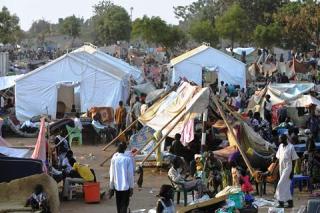UN vows to support African efforts to end S. Sudan war
June 15, 2015 (JOHANNESBURG/JUBA)– The United Nations will actively contribute to efforts aimed at finding peaceful solutions to the conflict in South Sudan, Jan Eliasson, the deputy secretary general of the world body told the African Union summit on Sunday.

Tens of thousands of people have been killed and nearly two million displaced by the conflict, which broke out in the world’s youngest nation in mid-December 2013.
The deputy secretary general requested the continental body to take a position necessary for resolving the conflict, which undermines regional and international efforts.
Elisson also stressed the need for peace and national reconciliation ahead of the proposed power-sharing between the South Sudanese government and opposition groups.
African heads of state must find effective interventions to eradicate the scourge of war on the continent, Zimbabwean President and African Union Chairman Robert Mugabe said.
“Excellencies, ladies and gentlemen, the prevailing political instability and insecurity in some parts of our continent clearly demonstrates the urgent need to fully operationalise the African Standby Force (ASF),” Mugabe told a gathering of African heads of state at the 25th African Union summit in Johannesburg on Sunday.
“We need to live up to our commitment to operationalise the African Standby Force by December 2015. This will be an important step towards the goal of silencing the guns by 2020, which is our pledge,” he added.
Mugabe said peace and security were prerequisites for the achievement of the continental body’s developmental targets, including Agenda 2063.
“I am encouraged by the fact that we are making steady progress in this regard. We have to redouble our efforts in dealing with the issue of the unnecessary loss of lives of our young people in the Mediterranean Sea in their desperate need to reach Europe and other places,” said the African Union chairperson.
“This matter requires our collective and urgent retention. Concrete steps have to be taken to deal with this unfolding tragedy, particularly in terms of addressing its root causes such as poverty, war and insecurity, lack of opportunities, perceptions of good and life abroad as well as stamping out human traffickers and smugglers,” he stressed.
NO XENOPHOBIC ATTACKS
The AU chairman said African countries must work together to eradicate xenophobic attacks similar to the spate of violence experienced in South Africa in recent months.
“While condemning the recent spate of barbaric violence targeted at foreign nationals…let us be cognisant of the fact that this is a problem that falls upon all of us and we should work together to find a solution. United we will not fail.”
“President [Jacob] Zuma has given us details of the programmes they have embarked upon. The government of South Africa will leave no stone unturned in trying to stem the violence.”
The high-level AU summit is being hosted by South Africa under the theme “2015: Year of Women’s Empowerment and Development Towards Africa’s Agenda 2063”.
Meanwhile, the African Union Commission chairperson Nkosazana Dlamini-Zuma told the summit that the recent Ebola outbreak had exposed the weakness of the continent’s health systems. She said the people dying on the Mediterranean sea and the victims of xenophobic violence in South Africa were driven by factors beyond their control.
“The lessons from the Ebola virus disease are that with African solidarity and resolve, we can find solutions to our challenges. The disease exposed the weakness of our health systems, especially public health. We must look at training more health workers and build our health systems and infrastructure,” she said.
“Excellencies, again we have been faced with the tragedy of many people dying in the Mediterranean sea and also the incidents of xenophobia. These are the people who leave their countries not out of choice, but out of desperation – to try and make a living elsewhere.”
The AU summit was attended by most African heads of state including Sudanese President Omar al-Bashir, wanted by the International Criminal Court for war crimes.
(ST).
